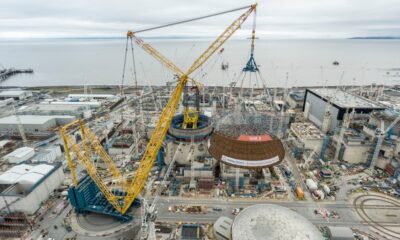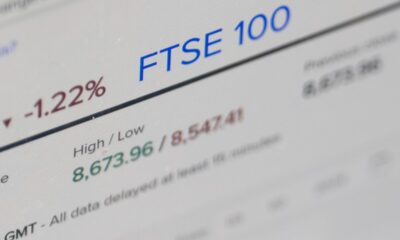Business
National Grid Shares: Five-Year Performance and Future Outlook

Investors who purchased shares in National Grid (LSE:NG.) five years ago have seen their initial investment of £20,000 grow to approximately £34,400. This marks a 33% increase since September 2020. When factoring in dividends, the total return rises to around 72%. However, this still falls short of the 86% return posted by the FTSE 100 during the same period. Meanwhile, passive index investors have outperformed National Grid, with their investments now valued at roughly £37,200.
Investment Strategy and Future Potential
The stock’s performance has been somewhat inconsistent, reflecting increased volatility in recent years. This fluctuation is largely due to National Grid’s ambitious £60 billion infrastructure investment plan aimed at modernizing its energy grids. The initiative seeks to enhance capacity, improve transmission efficiency, and ultimately increase profit margins.
Management projects that if these plans are executed successfully, the company could achieve annualized earnings growth of up to 8% by 2029, alongside reduced costs for customers over time. As of now, National Grid has invested over £10 billion, resulting in a 10% increase in its asset base and a 12% boost to underlying operating income, aligning with its growth targets.
Leading institutional analysts have provided optimistic projections for the company’s shares. Their 12-month price targets indicate potential capital gains as follows:
– Jefferies: 1,260p (+23.8%)
– RBC Capital: 1,175p (+15.4%)
– Barclays: 1,200p (+17.9%)
– JP Morgan: 1,170p (+14.9%)
– Bernstein: 1,150p (+13.0%)
Challenges Ahead
Despite the positive outlook, there are inherent risks that could impede National Grid’s performance. Even with flawless execution of its extensive investment project, external factors may still pose significant challenges. For instance, potential tariffs in the United States could disrupt supply chains and introduce inflationary costs, which may lead to project delays and budget overruns. Such issues could counteract the anticipated gains from improved infrastructure efficiency.
The regulatory landscape presents additional challenges. National Grid has already faced penalties from the UK’s Office of Gas and Electricity Markets (Ofgem) for delays in previous projects. Currently, discussions are ongoing regarding revenue limits for the company during the third regulatory price control period, which spans from April 2026 to March 2031. Ofgem’s proposed revenue limits suggest a 4.5% return on capital, considerably less than National Grid’s requested 6.3%. As negotiations continue, the final determination is expected in December this year, leaving some uncertainty regarding the company’s future financial framework.
Overall, while National Grid shares exhibit considerable growth potential, their status as a regulated monopoly may limit their ability to navigate future challenges independently. Given this context, some investors may approach buying shares with caution, despite the positive forecasts from analysts.
-

 Entertainment2 months ago
Entertainment2 months agoAnn Ming Reflects on ITV’s ‘I Fought the Law’ Drama
-

 Entertainment3 months ago
Entertainment3 months agoKate Garraway Sells £2 Million Home Amid Financial Struggles
-

 Health2 months ago
Health2 months agoKatie Price Faces New Health Concerns After Cancer Symptoms Resurface
-

 Entertainment2 months ago
Entertainment2 months agoCoronation Street’s Carl Webster Faces Trouble with New Affairs
-

 Entertainment2 months ago
Entertainment2 months agoWhere is Tinder Swindler Simon Leviev? Latest Updates Revealed
-

 Entertainment3 months ago
Entertainment3 months agoKim Cattrall Posts Cryptic Message After HBO’s Sequel Cancellation
-

 Science3 weeks ago
Science3 weeks agoBrian Cox Addresses Claims of Alien Probe in 3I/ATLAS Discovery
-

 Entertainment2 months ago
Entertainment2 months agoOlivia Attwood Opens Up About Fallout with Former Best Friend
-

 Entertainment3 months ago
Entertainment3 months agoMarkiplier Addresses AI Controversy During Livestream Response
-

 Entertainment3 months ago
Entertainment3 months agoMasterChef Faces Turmoil as Tom Kerridge Withdraws from Hosting Role
-

 Entertainment4 months ago
Entertainment4 months agoSpeculation Surrounds Home and Away as Cast Departures Mount
-

 World2 months ago
World2 months agoCole Palmer’s Mysterious Message to Kobbie Mainoo Sparks Speculation





















